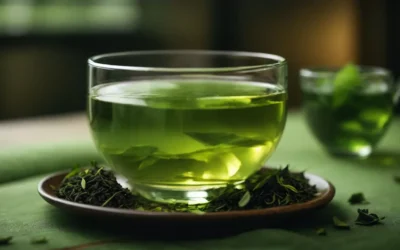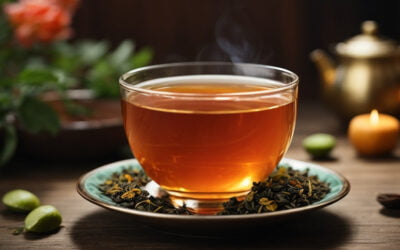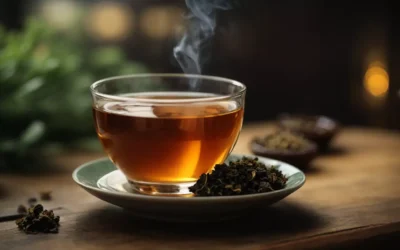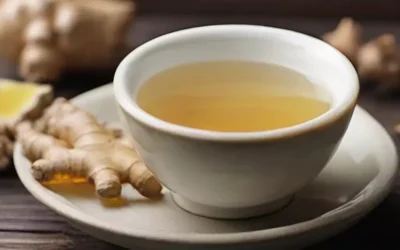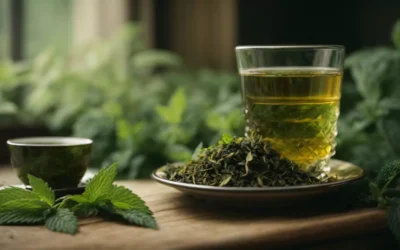Black tea, derived from the Camellia sinensis plant, is a globally beloved beverage known for its rich flavor and deep color. It is often enjoyed alongside white teas, leaf teas, and bagged teas, making it a popular choice among those who appreciate a variety of tea options. Additionally, black tea is often consumed as an alternative to coffee, providing a flavorful and energizing experience. With its robust taste and enticing aroma, black tea made from camellia sinensis assamica has become a staple in many cultures around the world, alongside white teas and leaf teas. Its popularity rivals that of coffee consumption. Whether you prefer loose-leaf teas or convenient bagged teas, there is a black tea product page for every tea enthusiast. Whether you prefer coffee consumption, the camellia sinensis assamica variety, or the plant, there is a black tea product page for every tea enthusiast.
Unlike its green tea cousin, black tea, made from the leaves of camellia sinensis assamica, undergoes a longer oxidation process. This process gives black tea its distinct flavor profile that ranges from malty to fruity to smoky. Black tea is a popular alternative to coffee consumption and is available in both leaf teas and bagged teas. The versatility of black tea, including leaf teas from the camellia sinensis assamica variety, makes it suitable for various brewing methods and pairings with food. Additionally, black tea can be a great alternative to coffee consumption.
We will also discuss the health benefits associated with consuming black teas and provide tips on how to brew the perfect cup. Additionally, we will explore the effects of coffee consumption and the importance of managing caffeine intake. So join us as we embark on a journey through the enchanting realm of black teas. Whether it’s the bold and robust flavor profile of coffee or the delicate and aromatic camellia sinensis assamica, our exploration will be a treat for the senses.
- Exploring the Origins and Varieties of Black Tea
- Health Benefits of Black Tea Consumption
- Delving into Black Tea and Heart Health
- Cognitive Enhancements and Focus with Black Tea
- Selecting and Brewing the Finest Black Tea
- Conclusion
- Frequently Asked Questions
Exploring the Origins and Varieties of Black Tea
Black tea, made from the leaves of the Camellia sinensis plant, is a popular beverage enjoyed globally. Originating in China, this tea has been consumed for centuries and is cherished by tea enthusiasts alongside other teas and coffee. Different countries have their own unique varieties of black tea, and coffee, each with its own distinct characteristics. These teas, made from the leaves of the camellia sinensis plant, offer a wide range of flavor profiles. Let’s delve into the origins and explore the diverse types of black tea, a beverage made from the leaves of the camellia sinensis plant.
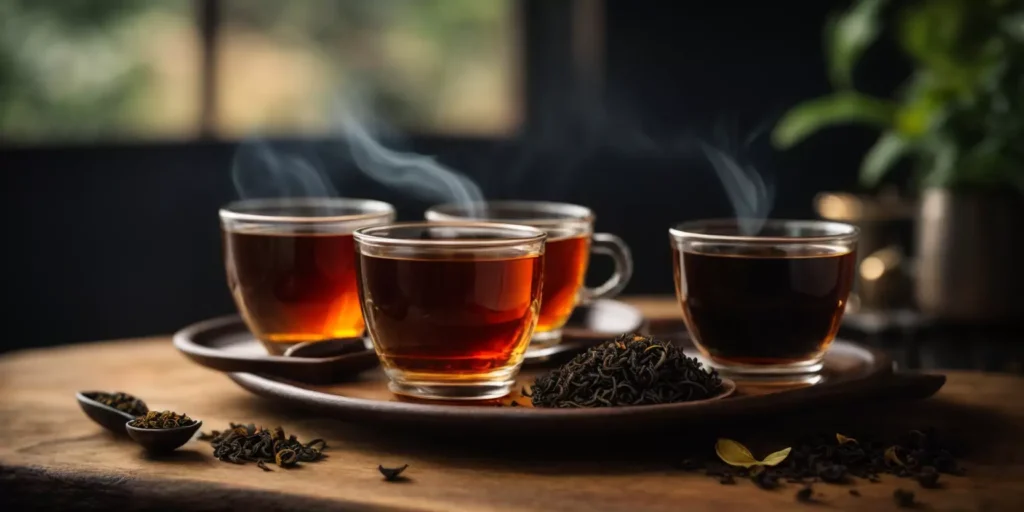
Assam: A Rich and Bold Variety
Assam black tea, made from the leaves of the camellia sinensis plant, is named after the region in India where it is primarily grown. It is a popular alternative to coffee for many people. Black tea is made from a variety of the Camellia sinensis plant called Camellia sinensis assamica. Black tea leaves are used in tea production and are grown in tea gardens. This black tea variety, derived from the camellia sinensis plant, thrives in Assam’s hot and humid climate, resulting in a robust and full-bodied tea that rivals the richness of coffee. Assam black tea, derived from the Camellia sinensis plant, is known for its malty flavor and bright reddish-brown color when brewed. Unlike coffee, Assam black tea contains caffeine and is often enjoyed as a refreshing alternative to green tea.
Darjeeling: The Champagne of Teas
Darjeeling black tea, derived from the Camellia sinensis plant, hails from the picturesque Darjeeling region in India’s Himalayan foothills. This tea contains caffeine, making it a popular alternative to coffee. Often referred to as the “Champagne of teas,” Darjeeling offers a delicate and muscatel flavor profile that sets it apart from other black teas. This green plant contains caffeine, making it a popular choice for coffee lovers. Black teas are a favorite among tea connoisseurs due to their light amber color, floral aroma, and slightly astringent taste. They are a great alternative to coffee for those looking for a different caffeine boost. The green plant is known for its health benefits and is often used to make these teas.
Ceylon: A Versatile Tea with Character
Ceylon black tea, a green plant-based beverage, comes from Sri Lanka, formerly known as Ceylon. It offers a refreshing alternative to coffee and is naturally low in caffeine. This tropical island nation produces an array of green teas that vary in flavor and strength depending on the altitude at which they are grown. These teas contain caffeine, which can have various effects on the body. Ceylon teas, known for their versatility, can be enjoyed plain or blended with other ingredients to create flavored teas like Earl Grey or English Breakfast. Whether you prefer a cup of plain green tea or a caffeine boost from a strong cup of coffee, Ceylon teas offer a wide range of options to satisfy any tea lover’s taste buds.
Other Notable Varieties
While Assam, Darjeeling, and Ceylon are prominent examples of black tea, there are many more noteworthy varieties of black tea produced worldwide.
- Keemun: A Chinese black tea known for its fruity and slightly smoky flavor. It is a great alternative to coffee for those looking to reduce their caffeine intake. With its green leaves and med aroma, Keemun is a popular choice among tea enthusiasts.
- Lapsang Souchong: A distinctive Chinese black tea with a bold and smoky taste, achieved through a unique drying process over pine fires. This tea is perfect for those who enjoy the rich flavors of black tea and the energizing effects of caffeine. Whether you’re a coffee lover or a tea enthusiast, Lapsang Souchong offers a unique experience that will satisfy your cravings.
- Nilgiri: Grown in the Nilgiri Hills of southern India, this tea is known for its fragrant aroma and smooth flavor. It contains caffeine, making it a great alternative to coffee.
Black tea, like coffee, can be enjoyed hot or cold and is often paired with milk or sweeteners to complement its flavors. It contains caffeine, similar to green tea, and a recent study has shown its potential health benefits. It is also used as a base for popular beverages like green tea lattes or iced coffees, which contain caffeine and have various effects. With its rich history and diverse range of flavors, black tea, like coffee, continues to captivate tea enthusiasts worldwide. The caffeine content in black tea is comparable to that of coffee, making it a popular choice for those seeking a morning boost. However, recent studies have shown that green tea may offer even more health benefits than its black counterpart.
Health Benefits of Black Tea Consumption
Black tea, like coffee, is not just a flavorful beverage; it also offers numerous health benefits. With its natural source of caffeine, black tea can provide an energy boost similar to that of coffee. Black tea has the same antioxidant properties as green tea, which makes it a healthy choice for people who want to add more nutrients to their diet. Regular consumption of black tea and coffee can have a positive impact on your overall well-being.
Rich in Antioxidants to Protect Against Cell Damage
Black tea has a variety of antioxidants that can protect our cells from damage caused by harmful molecules called free radicals. Both black and green tea contain caffeine, which can give us an energy boost. These antioxidants in tea, like polyphenols and catechins, can neutralize free radicals and prevent oxidative stress caused by drinking tea. By reducing oxidative stress, black tea may help prevent chronic diseases such as heart disease, cancer, and diabetes.
Improves Heart Health
Studies have shown that regular consumption of black tea, which contains caffeine, may help improve heart health. The antioxidants found in black tea can reduce the risk factors associated with heart disease, such as high blood pressure and high cholesterol levels.
Boosts the Immune System
Drinking black tea can boost your immune system and lower the risk of cancer. It has antioxidants that protect against infections and diseases. The caffeine in black tea helps the body’s defense mechanisms. Tea leaves have positive effects on cancer by improving the activity of white blood cells. Black tea can also reduce the frequency and severity of common illnesses like colds and flu. This is because of the caffeine in black tea, which supports immune health.
Delving into Black Tea and Heart Health
Reduced Risk of Heart Disease
Studies suggest that regular consumption of black tea, which contains caffeine, may reduce the risk of heart disease. This finding is significant as it highlights the potential health benefits of this popular beverage. Black tea, rich in flavonoids, has been found to have a positive impact on cardiovascular health. These antioxidants, found in black tea, are known for their beneficial effects on heart health. These tea polyphenols, found in green tea leaves, help protect the heart by reducing inflammation and oxidative stress, which are both linked to the development of heart disease.
Lower Cholesterol Levels
Black tea is good for your heart because it can lower cholesterol levels. Black tea also has vitamins and minerals that are good for you. It can lower “bad” cholesterol and reduce the risk of heart disease. The antioxidants in black tea can also improve cardiovascular health. Black tea has caffeine, so it can give you energy. Drinking black tea every day can help you stay healthy. Some studies have shown that black tea might also lower the risk of certain types of cancer.
Improved Cardiovascular Health
Drinking black tea may help improve heart health and lower the risk of heart disease. Research suggests that black tea can help reduce the risk of heart attacks and other cardiovascular problems. This may be due to factors like improved blood vessel function and lower blood pressure. A study found that drinking black tea for four weeks helped lower blood pressure levels. Another study showed that drinking three cups of black tea per day for 12 weeks can help lower “bad” cholesterol levels and increase “good” cholesterol levels.
Additional Considerations
Drinking black tea can be good for your heart, but it’s important to remember that other things like quitting smoking, staying active, eating well, managing stress, getting enough sleep, and drinking tea (especially green tea) are also important for a healthy heart. Black tea has caffeine, which can give you energy and help you focus. It also has antioxidants called clin that are good for your health. So, adding black tea to your routine can make you feel better overall. Just remember to talk to a doctor before making any big changes to your diet or lifestyle, especially if you have heart problems or take medicine. And don’t forget to enjoy your cup of black tea!
Cognitive Enhancements and Focus with Black Tea
Natural Energy Boost and Enhanced Focus
Black tea, a popular caffeinated beverage, provides a natural energy boost due to its caffeine content. It is enjoyed by many for its invigorating properties and the refreshing view it offers. When consumed in moderation, black tea can be an excellent alternative to coffee for those looking for a milder dose of caffeine. The view of many is that black tea offers a milder caffeine dose compared to coffee.
Support for Cognitive Function
Regular consumption of black tea, which contains caffeine, may have positive effects on cognitive function. Black tea is often consumed for its stimulating properties, attributed to the presence of caffeine. Therefore, incorporating black tea into your daily routine can potentially enhance your cognitive abilities and improve your overall view. The combination of caffeine and L-theanine found in black tea has been shown to improve attention and alertness while reducing mental fatigue. This can enhance the overall view of productivity and focus.
Incorporating Black Tea into Your Routine
To enjoy the potential cognitive benefits of black tea’s caffeine, you can incorporate it into your daily routine in various ways to get a stimulating view.
- Brew a cup: Use high-quality loose-leaf black tea or convenient tea bags to brew yourself a hot cup of black tea with caffeine. Enjoy the refreshing taste and the calming view it offers.
- During warmer months, enjoy the view of a refreshing iced black tea, prepared by brewing hot tea and cooling it down with ice. This beverage is perfect for those who enjoy the energizing effects of caffeine.
- For a creamy twist, add some milk or plant-based alternatives to your brewed black tea latte. Enjoy the caffeine boost while admiring the beautiful view.
- Black tea extract is a popular dietary supplement for those who enjoy the view of a more concentrated form of caffeine.
Remember to consume black tea in moderation and be mindful of your overall caffeine intake to ensure a balanced view of your tea consumption. While black tea offers numerous potential benefits, excessive caffeine consumption can lead to side effects such as restlessness, anxiety, or disrupted sleep patterns.
Drinking black tea can give you a natural energy boost and help you focus. It has caffeine and L-theanine, which make you feel relaxed but not sleepy. A study showed that black tea can improve your thinking abilities. It has polyphenols, including caffeine, which can support your brain function. So why not have a cup of black tea today and enjoy its benefits for your mind and body?
Selecting and Brewing the Finest Black Tea
Choose Loose-Leaf Black Tea for the Best Flavor and Quality
Selecting the right type is crucial. Opting for loose-leaf black tea rather than tea bags can significantly enhance both the flavor and quality of your brew. Additionally, loose-leaf black tea contains a higher amount of caffeine, providing a more energizing effect. Moreover, brewing loose-leaf tea allows you to enjoy a breathtaking view of the leaves unfurling and infusing in your teapot. Loose-leaf tea, which contains natural oils and flavors, offers a minimally processed option for those seeking a caffeine boost and a refreshing view on tea. This allows for a more robust taste profile with a complex flavor, thanks to the presence of caffeine. The finer particles found in tea bags cannot provide the same view.
Proper Brewing Techniques Enhance the Taste of Black Tea
To fully savor the rich flavors of black tea and enjoy its caffeine content, it is essential to follow proper brewing techniques. These techniques will ensure that you can appreciate the full view of the tea’s taste and aroma. The water temperature, steeping time, and view play vital roles in extracting the optimal flavors from the tea leaves. For black tea, boiling water is typically recommended, as it helps release its full-bodied flavor and allows for a better view of the caffeine content. Steeping times for black tea may vary depending on personal preference and tea consumption, but a general guideline is to steep for 3-5 minutes to fully enjoy its caffeine and view.
Experiment with Different Brewing Methods
Tea drinking is a delightful journey that offers endless possibilities for customization. Feel free to experiment with different methods to find your preferred strength and flavor, whether it’s the caffeine boost you desire or the serene view of enjoying tea. Some individuals enjoy adding milk or sweeteners to their black tea, while others prefer it plain or with a slice of lemon. The caffeine content in black tea can provide a stimulating effect, and enjoying a cup while taking in the view can be a delightful experience.
One popular method for brewing black tea is using an infuser or strainer to capture the view of the caffeine and al. This allows you to steep loose-leaf tea directly in your cup or teapot while keeping any sediment and enjoying the view of your drink without any caffeine. Another option for brewing larger quantities of black tea is using a French press, which ensures maximum flavor extraction. This method is convenient and allows for the consumption of caffeine.
Enjoying Black Tea as a Versatile Beverage
Black tea’s distinct flavor and caffeine content make it an incredibly versatile beverage that can be enjoyed in various ways, providing a refreshing view. Its unique taste sets it apart from other teas, making it a popular choice for tea lovers. While many people prefer sipping on hot cups of freshly brewed black tea, it can also be served over ice for a refreshing iced tea experience. This alternative way of enjoying black tea provides a different perspective and allows you to appreciate the caffeine content in a new light. Black tea, known for its caffeine content, can serve as a base for creating flavorful tea lattes or even incorporating it into culinary recipes.
One famous type of black tea is Darjeeling, known for its unique flavor, exquisite aroma, and caffeine content. Darjeeling offers a captivating view of the tea gardens, making it a popular choice among tea enthusiasts. Grown in the picturesque tea gardens of Darjeeling, India, this caffeine-rich tea boasts floral and muscatel notes that offer a delightful view for tea connoisseurs worldwide.
Conclusion
Black tea has many health benefits because it has caffeine and is soothing. It has a long history and is popular. It can help with heart health, blood sugar, and cancer prevention. Drinking black tea while looking at something nice can help you relax. Caffeine can make you more focused and clear-headed. To get the most out of black tea, use good leaves and brew it properly. Knowing about different types of black tea can help you choose the right one for you. Whether you like strong tea or delicate flavors, brewing it correctly will make it taste good. The caffeine in black tea gives you energy and watching the leaves steep in hot water is enjoyable.
Frequently Asked Questions
Can black tea help improve heart health?
Yes, black tea, with its caffeine content, has been shown to have positive effects on heart health. The view that black tea can benefit the heart is supported by research. It contains caffeine and antioxidants called flavonoids that can help reduce the risk of heart disease by improving blood vessel function and reducing inflammation. With its beneficial effects, this beverage offers a refreshing view of heart health.
Is black tea effective in preventing cancer?
While more research is needed, some studies suggest that the antioxidants in black tea may help prevent certain types of cancer. Black tea contains antioxidants that have the potential to provide various health benefits. These antioxidants can help neutralize harmful free radicals and hinder the development of cancer cells, ultimately supporting overall well-being.
How does black tea affect blood sugar levels?
Black tea, among other types, can be beneficial in regulating blood sugar levels due to its high polyphenol content. Research supports the notion that these compounds have the ability to slow down the breakdown of carbohydrates, resulting in a gradual increase in blood sugar levels after meals. This finding is backed by scientific studies.
Does black tea improve cognitive function and focus?
The caffeine and amino acid L-theanine present in black tea can enhance cognitive function and increase alertness, providing a boost to mental clarity and overall focus. This makes black tea a great choice for those looking to improve their view and attention. They work together to promote mental clarity, focus, improved mood, and a better view.
What factors should be considered when selecting and brewing black tea?
When choosing black tea, take into account factors such as origin, quality, flavor profile, personal preference, and the overall view. For brewing, use fresh water at around 200°F (93°C), steep for 3-5 minutes depending on desired strength, and adjust brewing time or temperature accordingly.




